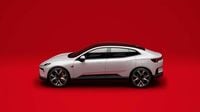Polestar, the Swedish electric vehicle manufacturer, is making significant changes to its operations in China, a market that has proven to be challenging for the brand. The company has announced that it will be shutting down a substantial number of its stores and exiting its joint sales venture in the country. This decision comes on the heels of disappointing sales figures, as Polestar managed to sell only 3,120 vehicles in China throughout 2024, a stark contrast to the booming market that saw a total of 12.9 million New Energy Vehicles sold, primarily dominated by local competitors.
In a strategic move to recalibrate its focus, Polestar is reducing its retail footprint in China by nearly two-thirds. The number of stores will shrink from 36 to just 10, according to sources familiar with the situation. This drastic reduction highlights the fierce competition Polestar faces in a market where local brands have established a stronghold, offering consumers a variety of choices that cater specifically to their preferences and needs.
Polestar's Chief Executive Officer, Michael Lohscheller, emphasized that the brand is not completely abandoning the Chinese market. Instead, he stated that the company is prioritizing certain markets where it sees more potential for growth. "We are focusing our efforts on regions that align better with our brand's vision and growth strategy," Lohscheller remarked. This indicates that while Polestar is scaling back in China, it remains committed to finding a viable path forward.
China's electric vehicle market has become increasingly crowded and competitive, with domestic manufacturers like BYD, Geely, and Xpeng leading the charge. These companies have not only captured significant market share but have also developed vehicles that are often more affordable and tailored to local consumer preferences. In fact, Polestar's struggles in China are indicative of a broader trend where foreign brands are finding it increasingly difficult to compete against well-established local players.
Despite the setbacks in China, Polestar is experiencing a resurgence in other markets. The first quarter of 2025 showed a remarkable 76% increase in global sales, suggesting that the brand's efforts to expand its presence in Europe and the United States are paying off. Lohscheller has specifically pointed to the UK and France as key markets for future growth. Additionally, Polestar has plans to bolster its sales network in the U.S. by 75%, expanding from 35 to nearly 60 locations. This expansion will leverage the existing Volvo dealer network, which could enhance Polestar's visibility and customer base.
Polestar's decision to exit its joint sales operation in China further underscores the challenges the brand has faced. The joint venture was intended to facilitate entry into the Chinese market, but the reality has proven to be more complex. The competition is not only fierce but also marked by rapid technological advancements and shifting consumer preferences. Local brands have been able to innovate and adapt to market demands much quicker than their foreign counterparts, leaving companies like Polestar scrambling to catch up.
As Polestar navigates this transition, it is crucial for the brand to solidify its identity and recognition in the markets where it intends to focus its energy. The company is not just vying for a share of the EV market; it is also competing for consumer loyalty against well-established names like Tesla and Cadillac. Building a distinct brand identity that resonates with consumers will be essential for Polestar's long-term success.
In conclusion, Polestar's recent decisions reflect the tough realities of the electric vehicle market, particularly in China, where local competition has intensified. While the brand may be stepping back from its ambitious plans in China, it is simultaneously laying the groundwork for growth in other regions. With a clear focus on expanding its presence in Europe and the U.S., Polestar aims to carve out a niche that distinguishes it from both its competitors and its corporate sibling, Volvo.





